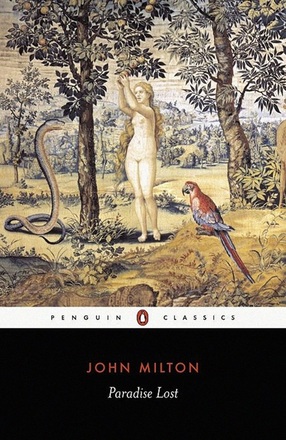By Alex Kosoris  I will have to make mention of my unfamiliarity with the style of language and literature, when approaching an epic poem the likes of Paradise Lost. This isn’t to say I had an impossible time understanding the Renaissance English; it just took me much longer to get through. (And, you know, the frequent notes were helpful.) I am, however, thankful that I stuck with the difficult task, as Milton’s poem chronicling the fall of Satan and the subsequent corruption and expulsion of Man from the Garden of Eden is beautifully written and surprisingly informative. I suppose the informative side of things comes more from my failings. Perhaps I didn’t read enough of my Bible, or perhaps I didn’t pay close enough attention in church, but I learned important, though basic, tenets of Christian theological logic, such as why Jesus was the only one who could die for our sins or why the Tree of Knowledge was in Paradise. Milton is very careful in his explanations, going far out of his way to not blame The Lord for the transgressions of Man and Foe, to the point where God starts sounding, frankly, a bit defensive as he speaks. But who am I to judge? As interesting as I found these teachings, however, I think the big, juicy excitement to be taken from Paradise Lost is in Milton’s use of language. At first, I thought it was merely due to the superb wordplay he employs – the likes of which are unmatched, barring, perhaps, the writings of Vladimir Nabokov – but it’s more than that. The ambiguous language and puns galore come primarily from the legion of sinners. Satan uses this strategy to sound more persuasive, though his arguments often ring hollow; this comes to great effect against Eve (spoiler), and seems to make him much more enticing to many readers. (I will admit I fell under his spell, as I was often much more excited to hear him and his rebellious horde converse than members of the holy army.) Conversely, God and the angels lack this ambiguity, this wordplay, as they do not lie; Milton was showing that there is consistency between their words and message, despite my earlier concerns about the godly defensiveness. Unfortunately, the biggest failing of Paradise Lost isn’t the old English, but, rather, that large chunks of the poem are tedious as all hell. So, it’s good, really good, in fact, but it’s very difficult to recommend picking it up just for a fun read.
4 Comments
2/10/2016 09:39:16 pm
Thanks for the review. Paradise Lost has been one of those books I've always thought about reading, especially FOR the language but now I'll make sure I have the time and brainspace to properly digest it.
Reply
2/10/2016 10:41:32 pm
Definitely try to give it your undivided attention. That being said, I think I got through a reasonable chunk in a bar in Duluth...
Reply
Brandon
2/11/2016 09:39:03 am
Alex, are the bars in Duluth that bad that you felt the need to read? Haha. Just teasing.
Reply
2/12/2016 08:57:31 am
(Huge dramatic sigh) It was even free darts that night, and all the dart boards were taken up. Being as timid as I was, I had to brood in my corner, reading fabulous poetry instead.
Reply
Your comment will be posted after it is approved.
Leave a Reply. |
NOWW Writers
Welcome to our NOWW Blog, made up of a collection of stories, reviews and articles written by our NOWW Members. |
Proudly powered by Weebly

 RSS Feed
RSS Feed